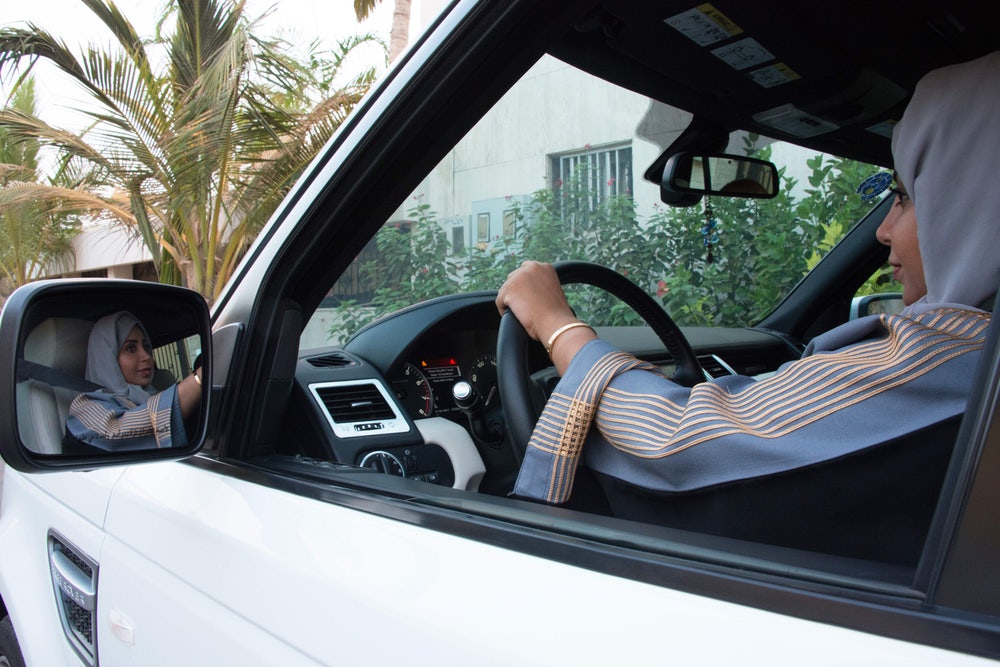24 June 2018 – Today the Saudi government lifted the ban on women driving, a ban dating from the founding of the kingdom in 1932. Americans for Democracy & Human Rights in Bahrain (ADHRB) cautiously welcomes the lifting of the ban. While it represents a step forward for Saudi women, we remain deeply concerned about ongoing and periodic intimidation, harassment, and detention of women’s rights activists, restrictions to women’s activities stemming from the system of male guardianship, and broader structural gender inequality.
In September 2017, Saudi king Salman bin Abdulaziz promulgated a royal decree lifting the ban on women driving beginning on 24 June. In some ways, this decree is the culmination of years of activism, as activists have been fighting for women’s right to drive since at least 1990. The first protest in 1990 saw dozens of women drive themselves through Riyadh in defiance of the ban. Among those women who participated were Dr. Aisha al-Mana and Madeha al-Ajroush. The women were pulled over by police and briefly detained, although they were released after they signed papers stating they would not undertake such actions again.
Since the first driving protest, women have occasionally taken to the road to protest the ban, despite facing repercussions from the government. In 2014, Loujain al-Hathloul tried to drive into Saudi Arabia from Abu Dhabi along with Maysaa al-Amoudi. Saudi officials arrested them at the border and detained them for 73 days although the government did not file formal charges. Since then, state authorities have repeatedly targeted, intimidated, and judicially harassed her.
Then, in September 2017, the king promulgated a decree granting women the right to drive. However, only weeks before the decree came into force, authorities detained 10 activists, seven women and three men, who had campaigned and advocated for women’s rights. Among them were Loujain al-Hathloul, Dr. Aisha al-Mana, Madeha al-Ajroush,Professor Aziza al-Youssef, Professor Iman al-Nafjan, Hessah al-Sheikh, Walaa al-Shubbar, Dr. Ibrahim al-Modeimigh, Mohammad al-Rabae, and Abdulaziz al-Meshaal. While many of the activists have been released, some, including Loujain have not.
“The lifting of the ban on driving is a welcome development in Saudi Arabia and a rare example of reform in the kingdom. However, we remain highly skeptical of the broader trajectory of women’s rights, as it remains to be seen whether there are hidden restrictions. More generally, however, this does not change the fundamental reality for many women: that as long as the guardianship system remains in place and structural gender inequality remains unaddressed women will remain second class citizens,” says ADHRB Executive Director Husain Abdulla. “We must also be clear: in many ways this is no great achievement. With this royal decree Saudi Arabia joins every other country in the world in allowing women to drive. If it wants to earn plaudits it must abolish the male guardianship system and seriously address broader gender inequality.”
While the Saudi government’s decision to end the driving ban for women is a positive step in addressing gender inequality, there is still much to be done. ADHRB cautiously welcomes the lift on the driving ban, but remains deeply concerned over other women’s rights issues, including the retention of the guardianship system, the kingdom’s treatment of female migrant domestic workers, and its lack of aggressive enforcement of current laws already in existence that are meant to protect women. We call on the Saudi government to take immediate steps to further empower women, lift restrictions on women, and work to promote and protect women’s rights and equal status with men.





